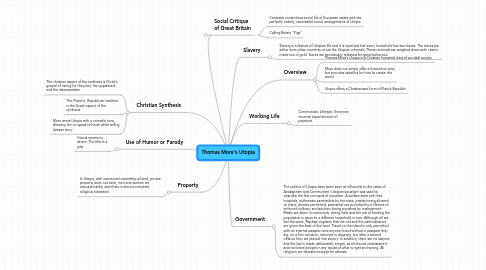Thomas More's Utopia
von junho seo

1. Christian Synthesis
1.1. The christian aspect of the synthesis is Christ's gospel of caring for the poor, the oppressed and the downtrodden
1.2. The Platonic, Republican tradition is the Greek aspect of the synthesis
1.3. More wrote Utopia with a comedic tone, allowing him to speak his truth while telling deeper story
2. Use of Humor or Parody
2.1. Utopia means no where- The title is a joke
3. Property
3.1. In Utopia, with communal ownership of land, private property does not exist, men and women are educated alike, and there is almost complete religious toleration
4. Social Critique of Great Britain
4.1. Contrasts contentious social life of European states with the perfectly orderly, reasonable social arrangements of Utopia
4.2. Calling Britain "Pigs"
5. Overview
5.1. Thomas More’s Utopia is a Christian humanist view of an ideal society
5.2. More does not simply offer a theoretical view, but provides specifics for how to create this world
5.3. Utopia offers a Christianized form of Plato’s Republic
6. Working Life
6.1. Communistic Lifestyle. Everyone receives equal amount of payment
7. Slavery
7.1. Slavery is a feature of Utopian life and it is reported that every household has two slaves. The slaves are either from other countries or are the Utopian criminals. These criminals are weighed down with chains made out of gold. Slaves are periodically released for good behaviour.
8. Government
8.1. The politics of Utopia have been seen as influential to the ideas of Anabaptism and Communism. Utopian socialism was used to describe the first concepts of socialism. A welfare state with free hospitals, euthanasia permissible by the state, priests being allowed to marry, divorce permitted, premarital sex punished by a lifetime of enforced celibacy and adultery being punished by enslavement. Meals are taken in community dining halls and the job of feeding the population is given to a different household in turn. Although all are fed the same, Raphael explains that the old and the administrators are given the best of the food. Travel on the island is only permitted with an internal passport and anyone found without a passport they are, on a first occasion, returned in disgrace, but after a second offence they are placed into slavery. In addition, there are no lawyers and the law is made deliberately simple, as all should understand it and not leave people in any doubt of what is right and wrong. All religions are tolerated except for atheists


